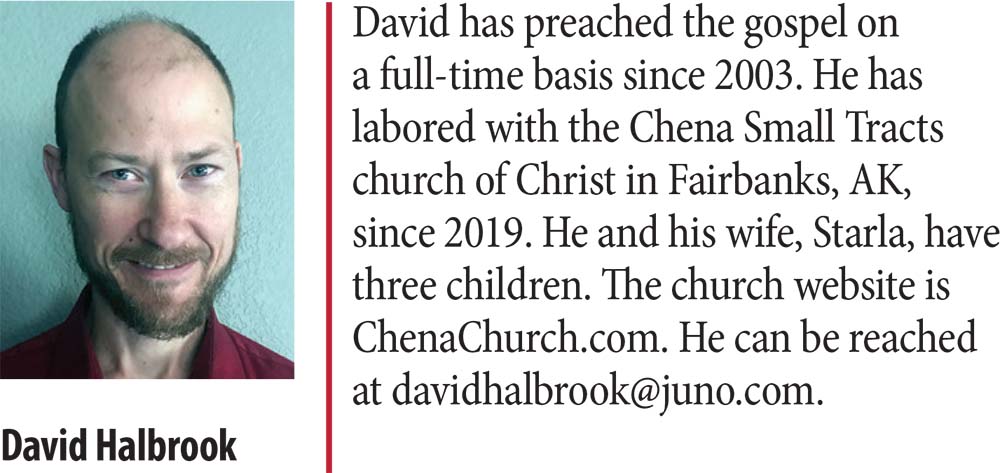by David Halbrook
Synopsis: Preaching requires patience, which refers to the state of remaining tranquil while awaiting an outcome or being able to bear up under provocation (BDAG).
Paul told Timothy to "preach the word. . . with great patience." Moreover, Jesus Himself is the model evangelist. We know more about His work than any other prophet or gospel preacher in Sacred Scripture. As Matthew, Mark, Luke, and John recorded Jesus's earthly ministry, they were also preserving a record of the prince of preachers. Among the qualities that shine in His work is His great patience. The evangelist who reads of Jesus's patience can learn to model Him. Saints, especially overseers, who read of His patience might recognize some strains and demands shared by evangelists today. All who preach the word or share in the life and work of men preaching the word will benefit by learning how Jesus preached the word with great patience.
Jesus's harshest words were directed at people who repeatedly demonstrated hard hearts, being unwilling to acknowledge and live by the truths they already knew. When Jesus rebuked them for rejecting the righteousness of God, the multitudes were fully aware (Matt. 5:20; 6:2, 5; cf. also 7:28-29). Yet, Jesus did not avoid such men. Even after three years of ongoing exchanges with them, Jesus did not quit. In the last week of His life, even when they rudely interrupted Him while He taught in the temple, Jesus patiently listened to their objections and responded in a way that kept the attention of anyone who was listening to the contrast between what was from heaven and what was from men (Matt. 21:23-27). When they avoided His question, Jesus did not feverishly rant and review their history of such dodges, but patiently pressed His point in a parable. As they repeatedly pressed Him but refused to respond substantively, Jesus never "dressed them down" with bitterness, wrath, anger, clamor, evil speaking, or malice (Matt. 22; Eph. 4:31). Even when He warned the multitudes and His disciples of them (Matt. 23), His verbal attacks were centered on matters which He knew to be true, not gossip, tale bearing, or lies, even though the religious leaders persisted in such assaults. Jesus Christ preached the word with great patience. What an impression this must have made on the multitudes and on the disciples who would later face these same enemies and types of attacks (Acts 3-8).
To you evangelists, when the scoffer and skeptic of our age mocks you (possibly through a public comment on Facebook or in a "Letter to the editor" of a local newspaper), remember that you know little about them personally. Unlike the religious leaders of Christ's day, many hard-hearted people today have never been exposed to the true law of Christ. Patiently offer to convince them, before you rebuke. Especially in public forums (either online or in face-to-face discussions with witnesses), do not be afraid to expose the error you have observed from them and remind them of the truth they have heard from you. At some point, you may recognize the futility of casting your pearls before swine. Even Jesus recognized the time when debate was useless (Matt. 7:6; Luke 22:66-69). His previous answers were not forgotten, and your words also may later arise in their minds, though unknown to you. When the hard-hearted ones and scoffers are your brethren, you face another challenge requiring great patience. Paul was preparing Timothy to face this challenge (2 Tim. 4:3). Timothy had some knowledge of the life of Jesus and of Paul to help him in such times, as do we. Speaking the truth in love requires great patience.
Elders, and all saints, continue giving evangelists the time that preaching the word publicly and from house to house requires (Acts 20:20). Great patience requires time for forethought, reflection, and prayer.
The time and truth Jesus invested with hard-hearted religious leaders was not wasted because others witnessed these encounters. Jesus knew the hearts of all who watched and listened. He recognized that some were "not far from the kingdom" (Mark 12:34). Even "secret disciples," like Joseph of Arimathea, eventually became emboldened (John 19:38). Among the many hypocrites, there were a few who were secretly weighing what they observed (John 3:1; 7:50). Nicodemus, for example, finally "had enough" of the council's stubbornness and stood with the disciples. Who else eventually acted likewise in Jerusalem during and after the day of Pentecost? We know many priests did (Acts 6:7). The fruit of Jesus's patience continued after His ascension.
Fellow-evangelists, we cannot see the hearts of others as did Jesus. Yet, we also encounter sinners who appear to be "near the kingdom"—people who grow dear to us and in whom we see great potential, though they are currently deceived by the doctrines and commandments of man. While their eternity is an urgent matter, you cannot rush their growth, so show great patience in your teaching. Thoroughly convince before you rebuke. After you rebuke, you might have to convince again, for repetition is an essential part of teaching and learning (2 Pet. 1:12). Consider how many times they have heard the error that you are countering. Though your loving, urgent exhortations may seem unheeded, your conduct among them is also speaking. While you work, wait, and hope to see fruit, let your anxiety for them be relieved in prayer for them (Phil. 4:6-7). By great patience, possess your soul and potentially win theirs (Luke 21:19; 1 Cor. 9:19-22).
The Lord's work among the disciples is among His greatest demonstrations of patience. The background, immaturity, misunderstandings, ego, competitiveness, covetousness, and future mission of the original twelve disciples proved the great patience of Jesus.
Evangelists, you enjoy the blessed opportunity of taking part in the conversion of sinners. As you convince, rebuke, and exhort the lost, you learn where they have been and the great struggle they endure while diligently seeking the Lord. You see their heart pricked by the gospel and then the brightness in their eyes when they decide to follow Jesus. Weeks or months later, they may be growing in leaps and bounds. Perhaps they begin showing signs of being like the rocky soil (which is a painful process for a preacher to observe). As you journey through the peaks and valleys, remember the great patience of Jesus. Peter walked on water. . . then sank. Peter declared his willingness to die with Jesus. . . then denied Him. In all this, remember the great patience of Jesus and wait on the Lord (cf. Ps. 27).
Elders, and all saints, your personal involvement in the conversion of others may vary from case to case. Naturally, when you are involved in their conversion, it is much easier to remain engaged (Matt. 28:19). At other times, you must find ways to involve yourselves in the lives of these new Christians. There is a host of reasons why this is essential, but among them is that new disciples need to see and hear the gospel from multiple sources. On an ongoing basis, they need to hear encouragement from, receive hospitality from, and be convinced of the love of many disciples.
Evangelists move. They also sin. Over time, they hopefully mature. While we are trying to lead others to Christ, a single evangelist cannot bring every new saint to maturity. Like Paul and Apollos, one plants, another waters, but God gives the increase (1 Cor. 3:6). Since we are fellow workers, let us be supportive of one another's work. When an evangelist has been closely involved in the conversion of a sinner, ask his advice on how you can help this new saint grow.
I hoped to write about having great patience with the church among you, great patience with brethren from whom we are divided, and also how to respond when patience is lacking. However, I am certain I am not essential to your understanding of such things. Whether you are an evangelist, hope to be an evangelist someday, are married to an evangelist, are an elder overseeing an evangelist, or are a spiritual sibling of an evangelist, I am confident that the great patience of Jesus will instruct you in preaching the word with great patience or in encouraging your brothers who do the work of an evangelist.


